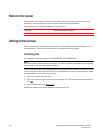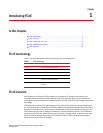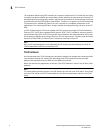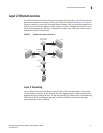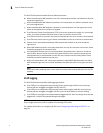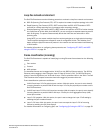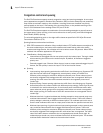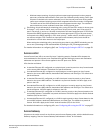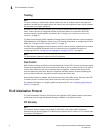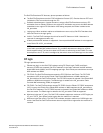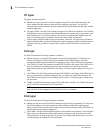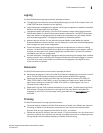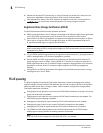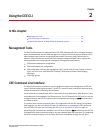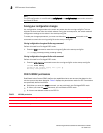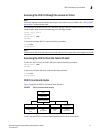
8 Dell Converged Enhanced Ethernet Administrator’s Guide
53-1002116-01
FCoE Initialization Protocol
1
Trunking
NOTE
The term “trunking” in an Ethernet network refers to the use of multiple network links (ports) in
parallel to increase the link speed beyond the limits of any one single link or port, and to increase
the redundancy for higher availability.
802.1ab Link Layer Discovery Protocol (LLDP) is used to detect links to connected switches or
hosts. Trunks can then be configured between an adjacent switch or host and the Dell FCoE
hardware using the VLAN classifier commands. See “Configuring an interface port as a trunk
interface” on page 37.
The Data Center Bridging (DCB) Capability Exchange Protocol (DCBX) extension is used to identify a
CEE-capable port on an adjacent switch or host. For detailed information on configuring LLDP and
DCBX, see “Configuring LLDP using the CEE CLI” on page 75.
The 802.3ad Link Aggregation Control Protocol (LACP) is used to combine multiple links to create a
trunk with the combined bandwidth of all the individual links. For detailed information on
configuring LACP, see “Configuring Link Aggregation using the CEE CLI” on page 65.
NOTE
The Dell software supports a maximum 24 LAG interfaces.
Flow Control
802.3x Ethernet pause and Ethernet Priority-based Flow Control (PFC) are used to prevent dropped
frames by slowing traffic at the source end of a link. When a port on a switch or host is not ready to
receive more traffic from the source, perhaps due to congestion, it sends pause frames to the
source to pause the traffic flow. When the congestion has been cleared, it stops requesting the
source to pause traffic flow, and traffic resumes without any frame drop.
When Ethernet pause is enabled, pause frames are sent to the traffic source. Similarly, when PFC
is enabled, there is no frame drop; pause frames are sent to the source switch.
For detailed information on configuring Ethernet pause and PFC, see “Configuring QoS using the
CEE CLI” on page 93.
FCoE Initialization Protocol
The FCoE Initialization Protocol (FIP) discovers and initializes FCoE capable entities connected to
an Ethernet cloud through a dedicated Ethertype, 0x8914, in the Ethernet frame.
FIP discovery
NOTE
This software version supports the October 8, 2008 (REV 1.03) of the ANSI FC Backbone
Specification with priority-tagged FIP VLAN discovery protocol and FIP version 0. This release does
not support FIP Keep Alive.



